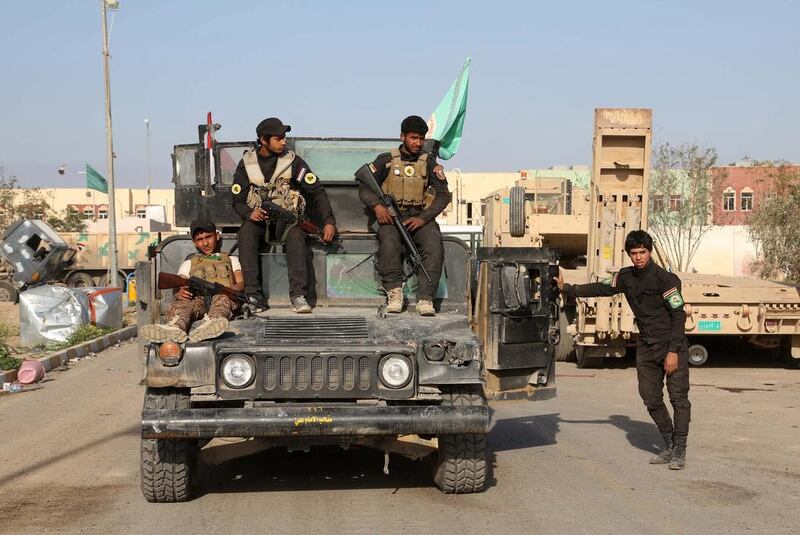BAGHDAD // One hot summer night in Baghdad, sweat poured down the faces of the Iraqi teens as they marched around a school courtyard, training for battle against ISIL.
This is summer camp in Iraq, set up by the country’s largest paramilitary force after Iraq’s top Shiite cleric issued an edict calling on students – some as young as 15 – to use their vacations to prepare to fight the Sunni extremists.
Dressed in military fatigues, Asam Riad, 15, was among the dozens of youths.
“We’ve been called to defend the nation,” the scrawny boy asserted, his voice cracking as he vowed to join the Popular Mobilisation Forces, the government-sanctioned umbrella group of mostly Shiite militias.
“I am not scared because my brothers are fighting alongside me.”
With dozens of such camps around the country, hundreds of students have gone through the training.
Over a dozen armed boys were on the front line in western Anbar province, including some as young as 10. Of around 200 cadets in a training class this month, about half were under the age of 18. Several said they intended to join their fathers and older brothers on the front lines.
It is yet another way minors are being dragged into Iraq’s brutal war as the military, Shiite militias, Sunni tribes and Kurdish fighters battle to take back territory from ISIL militants who seized much of the country’s north and west last year. The Sunni extremists have aggressively enlisted children as young as 10 for combat, as suicide bombers and as executioners in their horrifying videos. This month, Human Rights Watch said that Syrian Kurdish militias fighting the militants continue to deploy underage fighters.
Jaafar Osama, 15, said he wants to be a fighter when he grows up. His father is a volunteer fighting alongside the Shiite militias in Anbar and his older brother is fighting in Beiji, north of Baghdad.
“God willing, when I complete my training I will join them, even if it means sacrificing my life to keep Iraq safe,” he said.
The training programme could have serious implications for the US-led coalition, which provides billions of dollars in military and economic aid to the Iraqi government but has distanced itself from the Iranian-backed militias. Washington does not work directly with the Popular Mobilisation Forces, but the group receives weapons and funding from the Iraqi government and is trained by the Iraqi military, which receives its training from the US.
The Child Soldiers Prevention Act of 2008 says the US cannot provide certain forms of military support, including foreign military financing and direct commercial sales to governments that recruit and use child soldiers or support paramilitaries or militias that do.
The US embassy in Baghdad issued a statement saying Washington was “very concerned by the allegations on the use of child soldiers in Iraq among some Popular Mobilisation forces in the fight against ISIL”.
Last year, when ISIL stormed to the doorstep of Baghdad and threatened to destroy Shiite holy sites, Iraq’s top Shiite cleric, Ayatollah Ali Al Sistani, called on the public to volunteer to fight. Hundreds of thousands of men came forward to join the hastily-established Popular Mobilisation Forces along with some of the long-established Shiite militias, many of which receive support from Iran.
On June 9, as schools let out, Ayatollah Al Sistani issued a new fatwa urging young people in college, high school and even middle school to use their summer vacations to “contribute to [the country’s] preservation by training to take up arms and prepare to fend off risk if this is required”.
In response, the Popular Mobilisation Forces set up summer camps in predominantly Shiite neighborhoods from Baghdad to Basra. A spokesman for the group, Kareem Al Nouri, said the camps give “lessons in self-defence” and underage volunteers are expected to return to school by September, not go to the battle front.
A spokesman for the Iraqi prime minister’s office echoed that. There may be “some isolated incidents” of underage fighters joining combat on their own, Saad Al Harithi said.“We are a government that frowns upon children going to war,” he said.
But the line between combat training and actually joining combat is not clear, and it is weakly enforced by the Popular Mobilization Forces. Multiple militias operate under its umbrella, with fighters loyal to different leaders who often act independently.
At the training camp in a middle-class Shiite neighborhood of western Baghdad this month, the young cadets spoke openly of joining battle in front of their trainers, who did nothing to contradict them.
The US state department released its annual Trafficking in Persons report on Monday in which it lists foreign governments identified over the past year as having armed forces or government-supported armed groups that recruit and use child soldiers. The report lists Syria, but not Iraq.
Iraq has a long history of training underage fighters. Under Saddam Hussein, boys 12 through 17 known as “Saddam’s lion cubs” would attend monthlong training during summer breaks with the goal of eventually merging them into the Fadayeen – a paramilitary force loyal to Saddam’s Baathist regime.
The UN convention does not ban giving military training to minors. But Jo Becker, the advocacy director of the children’s rights division at Human Rights Watch, said that it puts children at risk.
Once in a combat situation, children are plunged into the horrors of war, she said. “They don’t have a mature sense of right and wrong and they may commit atrocities more easily than adults.”
* Associated Press





